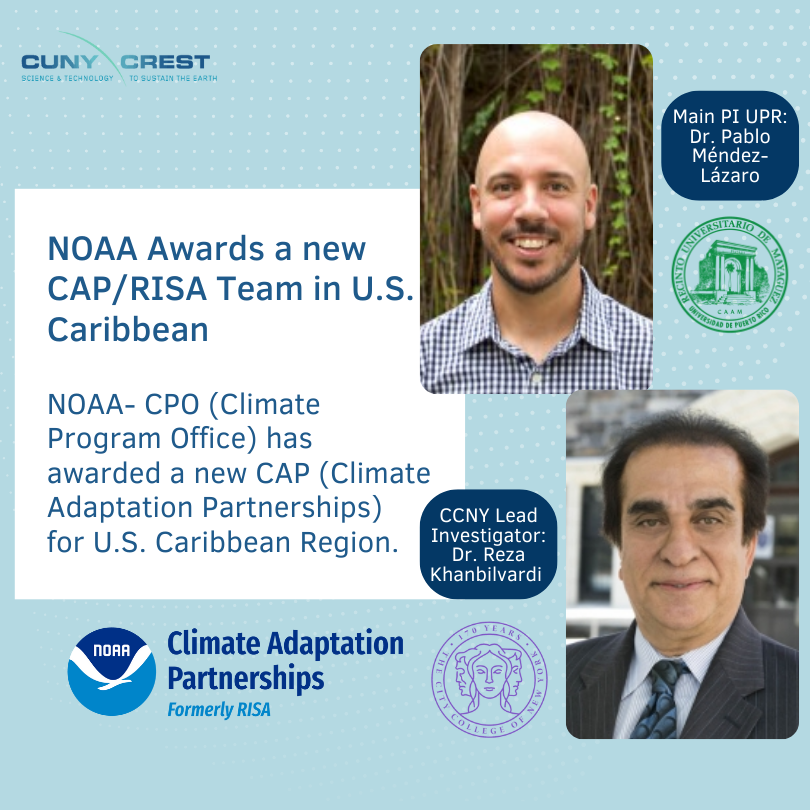NOAA Awards a new CAP/RISA Team in U.S. Caribbean
NOAA Awards a new CAP/RISA Team in U.S. Caribbean
NOAA- CPO (Climate Program Office) has awarded a new CAP (Climate Adaptation Partnerships) for U.S. Caribbean Region. CAP is the new name for the program that was formerly known as RISA (Regional Integrated Sciences and Assessment. The award is for a new 5-year CAP team in U.S. Caribbean region. This award will advance equitable adaptation in the Puerto Rico and U.S. Virgin Islands through sustained regional research and community engagement. The new CAP team will focus on multiple climate and society issues and develop a set of interconnected projects that build the capacity of regional partners to act on those issues. The U.S. Caribbean region covering Puerto Rico and the U.S. Virgin Islands which is labeled “Caribbean Climate Adaptation Network (CCAN). The title of this award is “ Caribbean Climate Adaptation Network: Building equitable adaptive capacities of the US Virgin Islands and Puerto Rico”.
The CAP program supports sustained, collaborative relationships that help communities build lasting and equitable climate resilience. Funded by 5-year cooperative agreements with NOAA, the work is accomplished by teams of research institutions, nonprofit organizations, and state/local governments in multi-state regions. CAP/RISA teams engage in a variety of applied and co-developed research and partnerships with communities.
This competitively awarded CAP totals $6,037,4681 in a cooperative agreement over the five-year period. The lead institution is University of Puerto Rico ( Dr. Pablo Mendez-Lazaro), with partnering universities Tischa Muñoz-Erickson, USDA Forest Service. Other partnering institutions included in this award include: University of the Virgin Islands, Worcester Polytechnic Institute, University of the Virgin Islands, University of South Florida, University of Puerto Rico, Mayaguez, University of Texas, Austin, City College of New York, University at Albany, NYU, and Caribbean Coastal Ocean Observing System. Dr. Reza Khanbilvardi is the City College lead investigator on the team.
This CAP team teams incorporate the principles of justice, equity, diversity, and inclusion into team composition, team management and decision-making, focal areas for research and engagement, geographies of practice, and in the approaches employed.
The new award seeks to enhance and expand partnerships through the development and convening of stakeholders in Puerto Rico (PR) and U.S. Virgin Islands (USVI). The team will utilize a human-centered design, bringing together impacted community and government stakeholders, and multidisciplinary scientists to develop and co-produce community climate adaptation capacities, strategies, and actions that build on locally grounded scenarios. This network is designed to help build adaptive capacities for future climate extremes, plan responses to cascading climate hazards and governance crises. The main goal is to enable effective decision-making that supports building just and equitable resilience in the USVI and PR. Specific attention will be given to climate hazards related to extreme rainfall, extreme heat, drought, landslides, and coastal and riverine flooding. By utilizing a human-centered approach, the network will develop effective and scalable climate actions. During this project, the team will utilize NOAA and other data products and tools to increase local climate adaptive capacity and resilience in underserved communities. The consortium will support and sustain education, research, and professional development in NOAA mission areas. The project will engage communities that are typically underrepresented in the U.S. Science, Technology, Engineering, and Math (S.T.E.M.) workforce, in decision-making and in policymaking.




